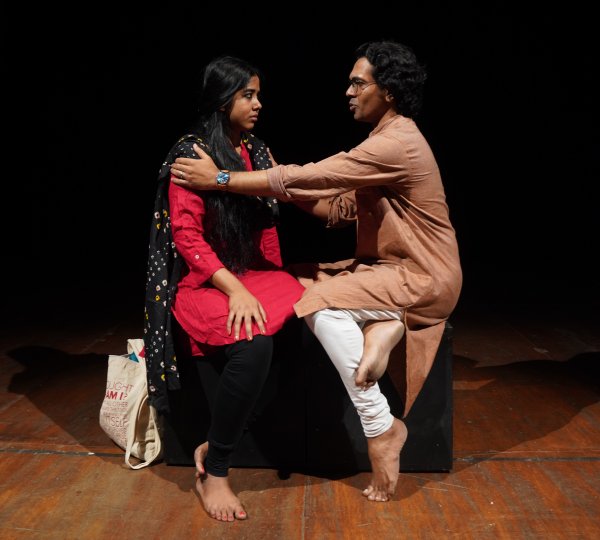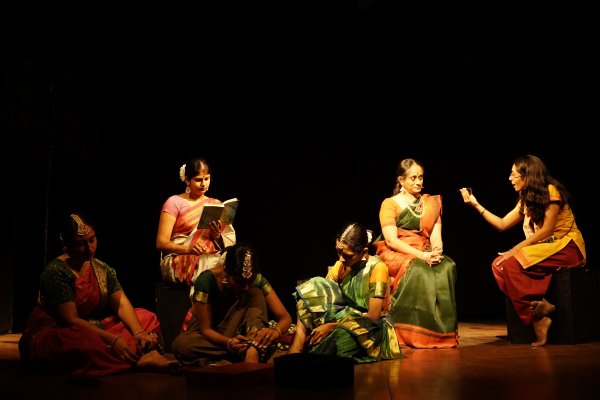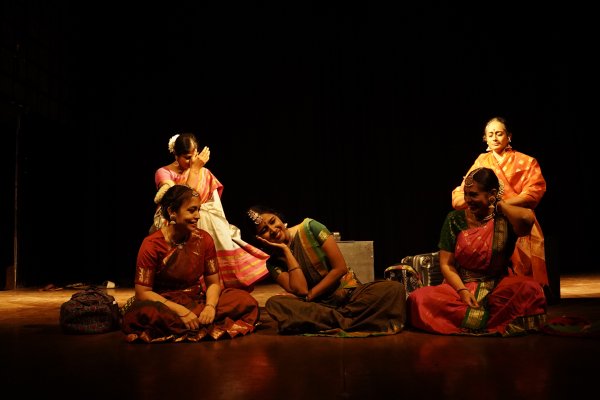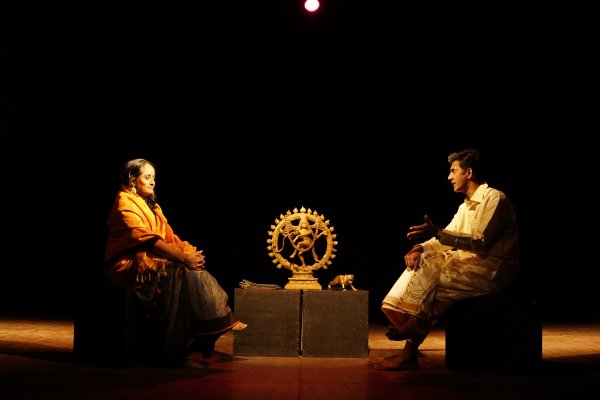
|   |

|   |
Margazhi - a time of agony and ecstasy - Nandini Krishnan e-mail: nandini@nandinikrishnan.com Photos: M Sivanesan March 29, 2022 Margazhi - a time of agony and ecstasy, so revered in the world of classical dance and music that even the most valid criticism of its skewed economics, nepotism, and obsequiousness to tradition is disguised as amusement. We speak of "sabha maamas" as if they were characters from an R K Narayan novel, not lecherous men whose control and power can wield enormous influence over dancers struggling to make it. These truths are rarely spoken by those who know them, because to speak up would be a career-ending move. This is why V Balakrishnan's 'Margazhi' makes one nod, laugh and hurt in equal measure.   The play is the story of Vaidehi - a talented dancer, as a sabha maama says, like "millions of others"; deserving of awards, like so many others; struggling under the burden of "spending 30,000 rupees for 5000 rupees' sanmanam", like so many others; playing gofer and chauffeur and daughter to her guru, like so many others (only for the said guru's husband to prey on her). The play subtly prods the audience to reflect on the structures of power, and the anachronism and the illogic that haunts the world of natyam, and buries so many careers in debt and obligation. From the insidious cycle of giving fees (euphemistically called "guru dakshina") but also guru seva, paying for costumes that are never delivered on time and are always ill-fitting, lobbying for shows and foreign tours, pitching choreography to an audience that wants razzle-dazzle on stage, and eventually charging students exorbitant amounts for their arangetrams, and even offering up students to sabha maamas, there is not a single aspect of dance today that isn't evoked in one's head. Among the most admirable aspects of the play is its faithfulness to reality. One particular sabha-maama-slash-organiser isn't content to have clandestine meetings with Vaidehi. He insists that she stay in a hotel with him. It isn't about the sex, so much as the announcement of sex - it is about power and perception. The double cast brought out such different aspects of the play that it was quite like watching two different plays. Anuradha Venkataraman as Vaidehi simmers with a contained rage and humiliation that is palpable. One wants to turn away when an organiser asks her to demonstrate her original choreography when she approaches him on behalf of her guru, to lobby for a US tour. As a dancer and dance teacher herself, Anuradha renders the dialogues so authentically the lines don't feel like they were written by someone else. Her dignity highlights her character's vulnerability, and one feels sorry for her while also admiring her. Her breakdown later in the play makes one feel somehow ashamed, for being part of the system or doing nothing about the system that habitually fails artists. Shakthi Ramani is more ebullient, her rage more on the surface; the firepower in her personality rejects pity. But her heightened display of emotion and her near-madness in a scene where she takes a contemporary dance workshop shocks the audience into silence. The actor seemed to have tears in her eyes when she was on stage, and to watch a strong person break into pieces is truly heart-wrenching.   The sabha maama and guru's husband are both essayed by a single actor - Ganapathy with Anuradha, and Karthik with Shakthi. Ganapathy's portrayal is made more intense by its subtlety. He makes no overt gestures, and never leers. It is his glances, silences, and stilted speech that strike one as sinister, a certain kind of sabha maama, perhaps more dangerous than the obviously lecherous. Karthik portrays the character as far less hesitant to make it known what he expects, touching the dancer almost inappropriately (but not quite), eroding her self-respect with lascivious smiles, broad hints and erasure of boundaries. Special mention must be made of Meera Sitaraman, who does a stellar job in a double role as a rookie journalist and a close friend of the dancer. From being yappy and sarcastic, she segues into being the support system that holds one up when one is most broken. The minor characters - an assistant to Vaidehi known only as "mami", and the three actors who play her students - all make an impression, because they live in their characters and make us think of the drudgery of being part of a repertory even as powerful dialogue is being exchanged between other characters. The play is worth several watches, with both casts. Perhaps it would come a full circle if it were staged in the hallowed sabhas of Madras during Margazhi. Many a "thiruttu muzhi" will be spotted in the audience. Nandini Krishnan is an author, actor, playwright and dancer. |